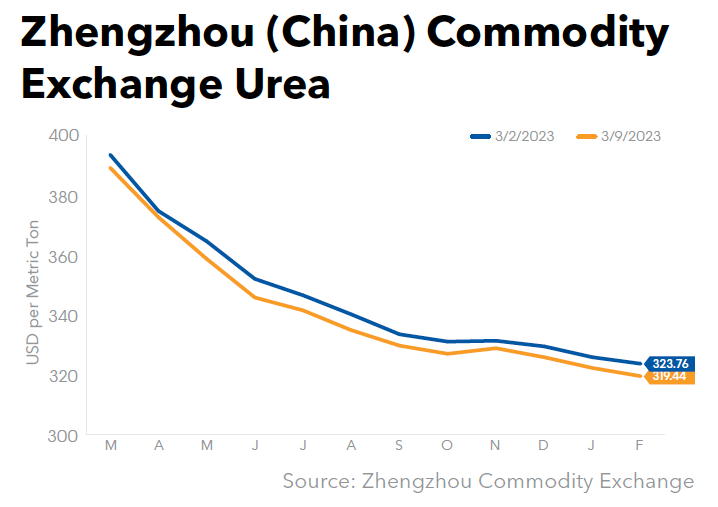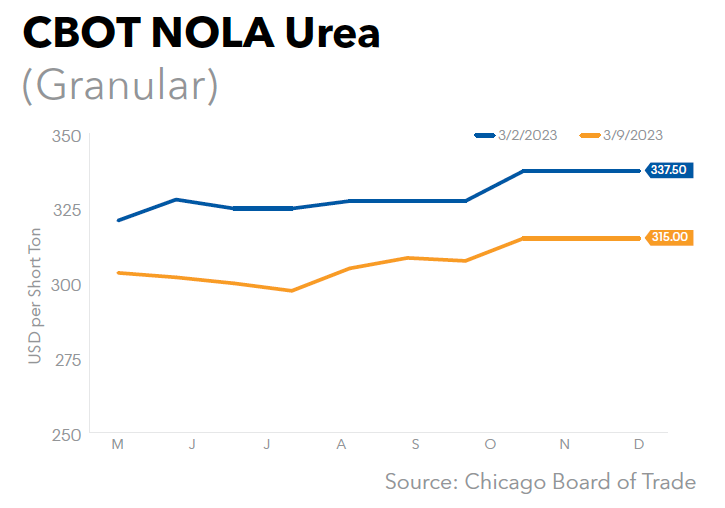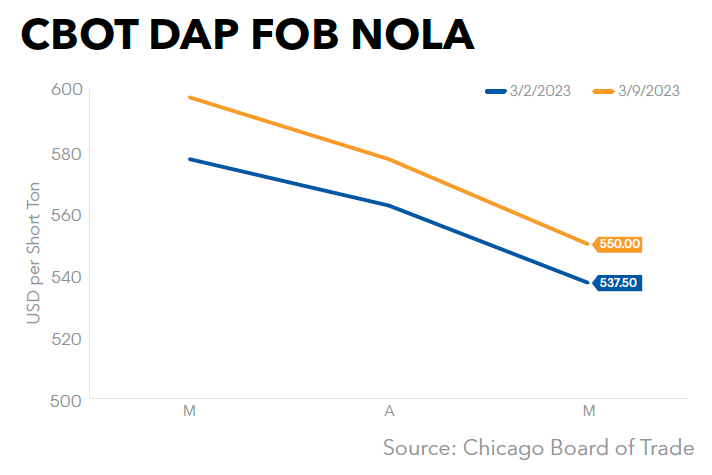Intrepid Potash Inc. reported fourth-quarter net income of $4.0 million on sales of $66.7 million, off from the year-ago $223.9 million and $71.9 million, respectively. The company’s 4Q 2021 net income was inflated by a $215.9 million valuation allowance for deferred tax assets, according to a company filing.
Adjusted EBITDA for the quarter was $23.1 million, down from
the year-ago $24.8 million. Intrepid attributed the lower quarterly sales
figures to deferred purchasing from buyers.
“During
the fourth quarter, the trend of our agriculture customers showing preference
for just-in-time purchases mostly continued until we saw a key fill program
announced in early January,” said Intrepid Executive Chairman and CEO Bob
Jornayvaz. “While some of the expected 2022 demand for our fertilizer products
was deferred into 2023, during the fourth quarter the diversity of our sales
mix into feed and industrial markets helped provide a stable floor for sales
volumes.”
Potash sales
totaled $43.8 million in the fourth quarter with an average net realized sales
price of $693/st, up from the year-ago $38.8 million and $504/st, respectively.
Intrepid produced more tonnage during the period, at 106,000 st versus 86,000
st in 4Q 2021, while selling 50,000 st compared to the year-ago 61,000 st, an
18% decline.
“Overall in 2022,
high potash pricing drove very strong financial performance for Intrepid, which
was among the best years in company history. Full-year adjusted EBITDA came in
at $142 million, adjusted net income totaled $80 million, and our cash flow
from operations totaled $89 million, which is net of the third-quarter $32.6
million customer refund,” Jornayvaz said.
“Using our strong
cash flow generation, we were able to begin our investments in growth projects
with the key goal of increasing our potash production and improving our
per-unit economics,” he added. “Moreover, under our share repurchase program,
we also returned approximately $22 million in capital in 2022, reducing our
outstanding share count by roughly 5% compared to the second-quarter 2022
average.”
Fourth-quarter
Trio® sales
totaled $17.3 million with an average realized price of $461/st, compared to
the year-ago $24.6 million and $388/st, respectively. The company produced
51,000 st in 4Q versus 53,000 st in the year-ago quarter, but sold just 28,000
st, down 42% year-over-year from 48,000 st.
Net income for full-year 2022 was $72.2 million on sales of
$337.6 million, compared with the prior year’s $249.8 million and $270.3
million, respectively. Adjusted EBITDA was $141.8 million, up from $67.6
million in 2021.
Potash sales
totaled $191.4 million in 2022 with an average realized price of $713/st,
improving on the prior year’s $151.8 million and $353/st, respectively. The
company sold 222,000 st of potash in 2022, off 33% from 2021’s 331,000 st,
while producing 270,000 st for the 12-month period, down from 287,000 st in
2021.
Trio® sales for
2022 were $117.8 million with an average realized sales price of $479/st,
rising from the prior year’s $96.1 million and $295/st, respectively. Sales
volumes for 2022 fell 18%, however, to 197,000 st versus 239,000 st in 2021.
Production was reported at 226,000 st for 2022, off from 228,000 st in 2021.
Intrepid expects
the strong fertilizer market to continue into 2023, powered in part by ongoing
potash supply uncertainty stemming from the war in Ukraine. The company’s key
focus for the year ahead, according to Jornayvaz, will be the successful
execution on its growth projects, with the goal of improving the cost side of
Intrepid’s potash production unit economics.
“Looking at the
broader macro environment for potash, there continues to be a structural potash
supply gap owing to the Belarusian sanctions and concerns around Russian
supply, which should continue to provide a relatively high floor for pricing in
2023 and beyond, even as incremental supply from other projects starts to enter
the market,” Jornayvaz said.
“As for the
outlook, we are pleased to share that this year is off to an encouraging
start,” he added. “US farmers have wrapped up two consecutive years of very
high profitability, are entering 2023 with strong balance sheets, and high
prices for crop futures point to another year of robust farmer economics. For
the first quarter, we have seen strong demand for our potash and Trio®, which we
expect to continue throughout the year as farmers will likely be incentivized
to maximize their yields.”
|
Potash
|
4Q-22
|
4Q-21
|
2022
|
2021
|
|
Sales (000 st)
|
43,756
|
38,807
|
191,378
|
151,751
|
|
Gross Margin ($000)
|
20,907
|
12,516
|
94,769
|
35,845
|
|
Sales Volume (000 st)
|
50
|
61
|
222
|
331
|
|
Production Vol. (000 st)
|
106
|
86
|
270
|
287
|
|
Avg Realized Price ($/st)
|
693
|
504
|
713
|
353
|
|
Trio®
|
4Q-22
|
4Q-21
|
2022
|
2021
|
|
Sales (000 st)
|
17,265
|
24,612
|
117,826
|
96,058
|
|
Gross Margin ($000)
|
3,429
|
7,913
|
39,123
|
16,442
|
|
Sales Volume (000 st)
|
28
|
48
|
197
|
239
|
|
Production Vol. (000 st)
|
51
|
53
|
226
|
228
|
|
Avg Realized Price ($/st)
|
461
|
388
|
479
|
295
|
|
Oilfield Solutions
|
4Q-22
|
4Q-21
|
2022
|
2021
|
|
Sales (000 st)
|
5,732
|
8,479
|
28,668
|
22,770
|
|
Gross Margin ($000)
|
1,315
|
1,420
|
7,516
|
3,477
|


